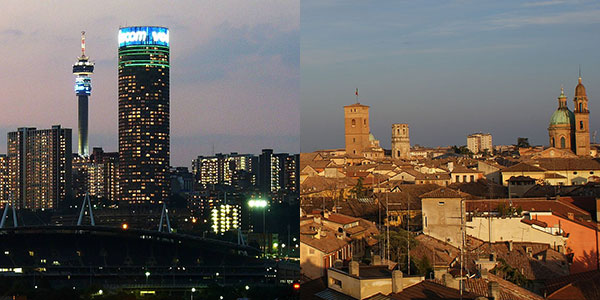Gauteng City-Region Observatory signs MOU with Italian municipality, strengthens historical ties
- Wits University
Memorandum of understanding between Gauteng and Italian municipality Reggio Emilia the latest gesture in a long-standing friendship between Italy and SA.

The relationship blossomed when Reggio Emilia supported apartheid struggle exiles Oliver Tambo and Anthony Mongalo, signing a solidarity pact with the ANC in 1977 and publishing the party’s official newsletter in Italian in 1978.
In 2023, Gauteng and Reggio Emilia will collaborate in key research areas with the aim of strengthening economic, cultural, and educational ties across both regions.
Mutual priorities include food and food safety, the automotive sector, memory and heritage, and early childhood development, education, and sport.
At a high-level virtual workshop organised by the Gauteng City-Region Observatory (GCRO), the Italian Ambassador in South Africa, Paolo Cuculi; South African Ambassador to Italy, Nosipho Nausca-Jean Jezile; Gauteng Provincial Government Deputy Director General, Marie Louise Moodie; and Reggio Emilia Municipality MMC for Education and Sport, Raffaella Curioni, noted their appreciation for the bilateral agreement between Gauteng and Reggio Emilia, and how this will aid greater innovation and development in both regions.
A visit by the Mayor of Reggio Emilia to Gauteng in 2022 preceded the workshop.
The GCRO, Wits University, Tshwane University of Technology, University of Pretoria, University of Johannesburg, Unimore (Reggio Emilia’s universities), and the E35 Foundation will all collaborate to promote research, teaching and student exchanges, mutual accreditation, and the sharing of critical data.
The GCRO is a partnership established in 2008 between Wits University, the University of Johannesburg, the Gauteng Provincial Government, and organised local government in Gauteng. The establishment of the GCRO was motivated by the vision of a fast-growing and dynamic urban region.
Better planning, management and co-operative government relies on improved data, information, analysis, and reflective evaluation. This is essential to set the strategic agendas shared across government, and between government and its civil society and business partners. The GCRO is charged with building this strategic intelligence.
“We have identified areas of mutual interest and hope that research, exchanges, sharing of knowledge and partnerships will allow both regions to grow together and deepen social, economic and cultural ties,” said Rashid Seedat, GCRO Executive Director.

Seedat applauded all parties for bringing ideas to fruition, with the already established and long-running Africa Reggio Emilia Alliance, which focuses on early childhood development, noted as an example.
The Alliance facilitates educational trips to Reggio Emilia where educators can learn about the region’s iconic teaching methods, provides training to early childhood practitioners in all socio-economic settings in South Africa, and develops material which has been translated into English, isiZulu and Sesotho.
The Alliance publishes many free resources for teachers and parents, guiding their journeys through the Reggio Emilia method.
Other existing projects include the Reggio Africa Historical Archive, which Gauteng Premier Panyaza Lesufi visited in 2023.
Over the years there have been business summits and meetings to explore partnerships between Gauteng and Reggio Emilia.
Several Italian entrepreneurs and exporters visited South Africa with the aim of establishing distribution channels and agreements for development projects.
In summarising the 2023 MOU workshop, E35 Foundation Project Manager, Sabrina Rosati, noted the many possibilities both regions can still explore and develop together.
“I think this will go beyond only universities and research entities. There is potential for collaboration across broader society.”
Rosati also noted the possibility of leveraging European Union funding and to position the Reggio Emilia and Gauteng partnership as an investor-worthy and sustainable multilateral platform.
